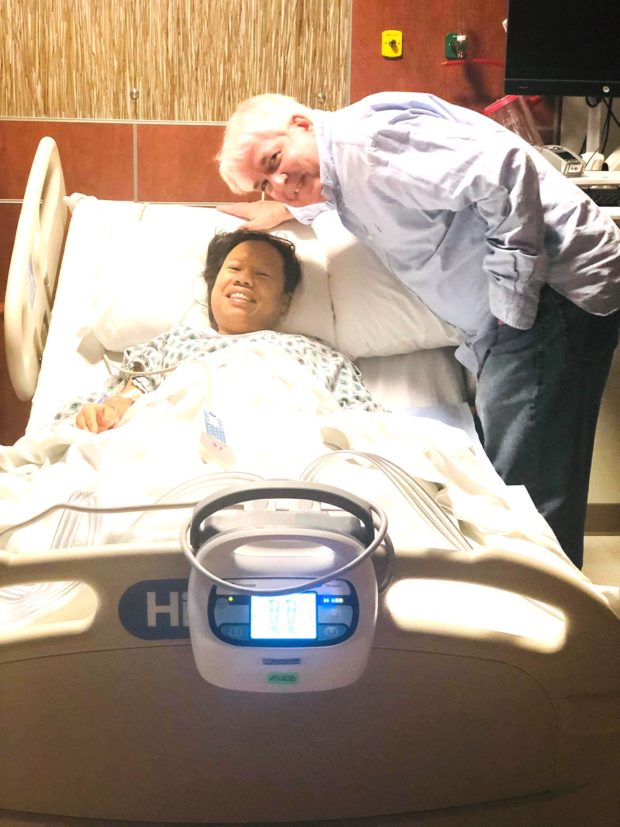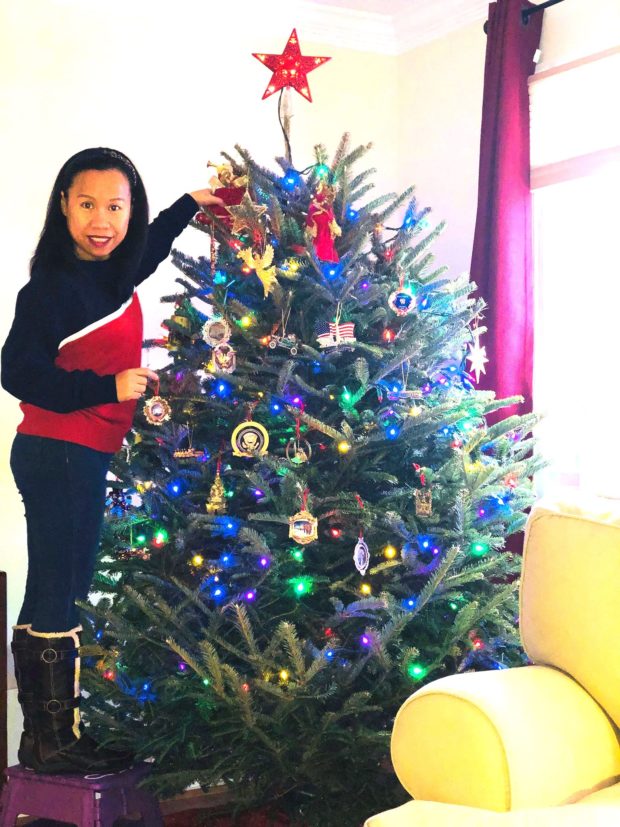Fil-Am journalist uses bout with cancer to help fight the disease
Barry Ziman comforting Josie after her mastectomy. CONTRIBUTED
Josie Moralidad Ziman, 46, was diagnosed with Stage 0 and 1 breast cancer, ductal carcinoma in situ or (DCIS NSITU) on Sept.13, 2018. The next day she had a mastectomy.
“I understand that a part of my body is gone now, but everything else is still there including my soul, my heart and my mind. I’m still a woman in every sense of the world and nothing changed for the worse,” Josie says.
More than that, Josie has become more empathetic towards women who are in the same situation. Cancer made her see that each day is “especially important” to bother with trivial matters.
Josie is a broadcast host of “Pilipinas sa Amerika” of RMN ILOIlO US, a staffer at Manila Mail in Washington, DC and a correspondent assigned to the White House.
“We all have a purpose on this earth. If sharing my story and using my radio voice would be able to convince every woman to get a mammogram, I will do it every day just to save someone’s life. It’s worth fighting for” Josie says.
Struggles
Josie’s life is fraught with struggles but she has shown herself to be stronger than adversities. She has always been a survivor.
She came to the United States in May 2002 with a journalist visa. She has not been back to the Philippines since then.
She worked as a housekeeper and nanny, and watched three big black dogs and a baby bear and was treated like a slave by some families. At the same time, she was doing radio reporting from America to the Philippines.
Her weekly salary was not even enough to cover her taxi fares. Josie admits that she had few friends and the Filipinos she met looked down on her because she was just a “housekeeper.”
It was during this challenging times in 2003 that Josie met her husband, Barry Russell Ziman through radio interviews. Ziman is a director for government affairs for the College of American Pathologists in Washington, DC.
Six weeks after her mastectomy, Josie was back on her feet. “Life is meant to be lived by facing the challenges it brings,” she says. CONTRIBUTED
Josie studied early childhood development. Later, she worked at the children’s center of the Securities and Exchange Commission “Bright Horizons” in Washington, DC. Eventually, she met a lawyer from SEC who offered her a job to be a nanny for their baby. She was able to establish herself and became
A sought-after nanny or teacher-caregiver for young children.
“To be honest, I earned more money being a teacher-caregiver than being a journalist,” Josie laughs.
But life can change in a snap.
Close calls
December has not always been the best time for Josie and Barry. For Josie, it always reminds her of life’s fragility and her own mortality.
Five years ago, Josie was diagnosed with a herniated disc that almost left her paralyzed. On Dec.23, 2013, she underwent a back surgery. After four months, while driving her Toyota Corolla, she was rear-ended by a dump truck. The accident resulted in physical pain and mental anguish. She was treated for Post-Traumatic Stress Disorder (PTSD).
On Dec. 31, 2014, Josie was found unconscious and bleeding in their bathroom.
“My husband said I stumbled in the bathroom and was not responsive. He had to call the 911 because of so much blood on my chin. I had a laceration and 15 stitches,” Josie recalls.
Big C
Josie has always been proactive when it comes to health–eating a balance diet, not smoking or consuming alcoholic drinks.
“I started my annual breast cancer screening with mammogram and sonogram at the age of 31 after I developed an abscess infection in one of my nipples,” Josie says.
Aside from the routine check-up, Josie had genetic testing and found out that there’s no history of cancer in her family except for an aunt (her mother’s sister), who was a heavy smoker was diagnosed with breast cancer ten years ago but had a remission.
On Sept. 13, 2018, during the routine breast screening, the radiologist found calcifications or calcium deposits the size of tip of a pen in Josie’s left breast. These were located outside the chest wall close to the left shoulder. The supposed 30-minute needle biopsy lasted for 2 ½ hours.
Josie was diagnosed with DCIS NSITU, a non-invasive cancer where abnormal cells have been found in the lining of breast milk duct. It means that the cancer was confined or contained in one place and had not spread outside of the ducts or lobules into the surrounding breast. It is usually non-life threatening but could increase the risk of developing invasive breast cancer.
After her mastectomy, the doctors had another biopsy and found more clusters of micro calcifications with DCIS NSITU and one was about to break which was less than a millimeter. Fortunately, they were able to remove it, and the sentinel lymph node biopsy came out negative, which means the cancer didn’t spread in her breasts or any parts of her body. Instead of chemotherapy, Josie is taking hormone therapy pills for the next five years.
Advocacy against cancer
In 2018, according to the World Health Organization (WHO) there were 9.6 million cancer deaths. Female breast cancer ranks as the fifth leading cause of death in the world with 627,000 deaths or 6.6% of the total cancer related deaths.
Josie advices women especially over 40 to get an annual mammogram.
“You may not like the mammogram procedure or any other medical procedures, but don’t be hesitant, it’s better to be detected early as they say, ‘Early detection can save lives.’ If you have no family history of cancer, it’s not a guarantee you will not get it”.
Now an advocate against cancer, Josie wants to be a “friend and listener” to women battling the disease.
As the year ends, Josie is moving on to start a new chapter in her life. Her faith in God, positive outlook in life and the support and love of family, spouse and friends give her strength.



